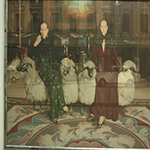Euroacademia Conferences
 Europe Inside-Out: Europe and Europeanness Exposed to Plural Observers (9th Edition) April 24 - 25, 2020
Europe Inside-Out: Europe and Europeanness Exposed to Plural Observers (9th Edition) April 24 - 25, 2020 Identities and Identifications: Politicized Uses of Collective Identities (9th Edition) June 12 - 13, 2020
Identities and Identifications: Politicized Uses of Collective Identities (9th Edition) June 12 - 13, 2020 8th Forum of Critical Studies: Asking Big Questions Again January 24 - 25, 2020
8th Forum of Critical Studies: Asking Big Questions Again January 24 - 25, 2020 Re-Inventing Eastern Europe (7th Edition) December 13 - 14, 2019
Re-Inventing Eastern Europe (7th Edition) December 13 - 14, 2019 The European Union and the Politicization of Europe (8th Edition) October 25 - 26, 2019
The European Union and the Politicization of Europe (8th Edition) October 25 - 26, 2019 Identities and Identifications: Politicized Uses of Collective Identities (8th Edition) June 28 - 29, 2019
Identities and Identifications: Politicized Uses of Collective Identities (8th Edition) June 28 - 29, 2019 The European Union and the Politicization of Europe (7th Edition) January 25 - 26, 2019
The European Union and the Politicization of Europe (7th Edition) January 25 - 26, 2019 7th Forum of Critical Studies: Asking Big Questions Again November 23 - 24, 2018
7th Forum of Critical Studies: Asking Big Questions Again November 23 - 24, 2018 Europe Inside-Out: Europe and Europeanness Exposed to Plural Observers (8th Edition) September 28 - 30, 2018
Europe Inside-Out: Europe and Europeanness Exposed to Plural Observers (8th Edition) September 28 - 30, 2018 Identities and Identifications: Politicized Uses of Collective Identities (7th Edition) June 14 - 15, 2018
Identities and Identifications: Politicized Uses of Collective Identities (7th Edition) June 14 - 15, 2018
“Colonized Masculinity” in 1960s Québec Cinema
-
-

-
Presentation speakers
- Philippe Bédard, Concordia University, Canada
Abstract:
Just as colonial rule crushes subordinate national narratives, so too does it destroy the idea of masculinity within the colonized male. Anti-colonial discourses, such as those active in Québec in the 1960s, have used the gendered metaphors of emasculation and rape to decry the particular ways in which men are the true victims of colonial oppression. This essay looks at the particular case of the anti-colonial events that took place in 1960s Québec, a political context which is seldom addressed, to discuss the issue of such gendered metaphors. By analyzing the discourses of anti-colonial and national liberation movements that took place at that point in time, and by looking at gender representations in films of the period, this project demonstrates how men were portrayed as the victims of colonialism as a way of calling the nation to arms against the oppressor. In addition to addressing the obvious problems of such victimization of men over women, this paper studies the consequences of this notion of “colonized masculinity.”
To do so, I call upon the writings of Franz Fanon, instrumental to any discussion of colonialism, as well as Sean Mills’ comprehensive account of the political climate in 1960s Montréal in his book “Empire Within”. In addition, this essay sifts through theories that deal with the representations of masculinity in English-Canadian cinema and Québec films specifically. Those include Robert Fothergill’s “Coward, Bully, or Clown”, Lee Parpart’s “Pit(iful) Male Bodies: Colonial Masculinity”, and Christine Ramsay’s “Cinema from the Margins.”
By covering these concepts, this paper aims to challenge the model of masculinity that was constructed in the context of post-colonial thought in 1960s Québec culture. By extension, the aim of this essay is to address the consequences that this construction of gender has had up to date. -
Related Presentations

Identity and Antagonism in the Nagorno-Karabakh Conflict
- Imogen Davidson White

Performing the Abject: Volatile Moments of Identity in Sarah Kane’s 'Phaedra’s Love'
- Eva Spambalg-Berend

The Myth of Egalitarianism’ in the Consumption Society
- Amirpasha Tavakkoli















